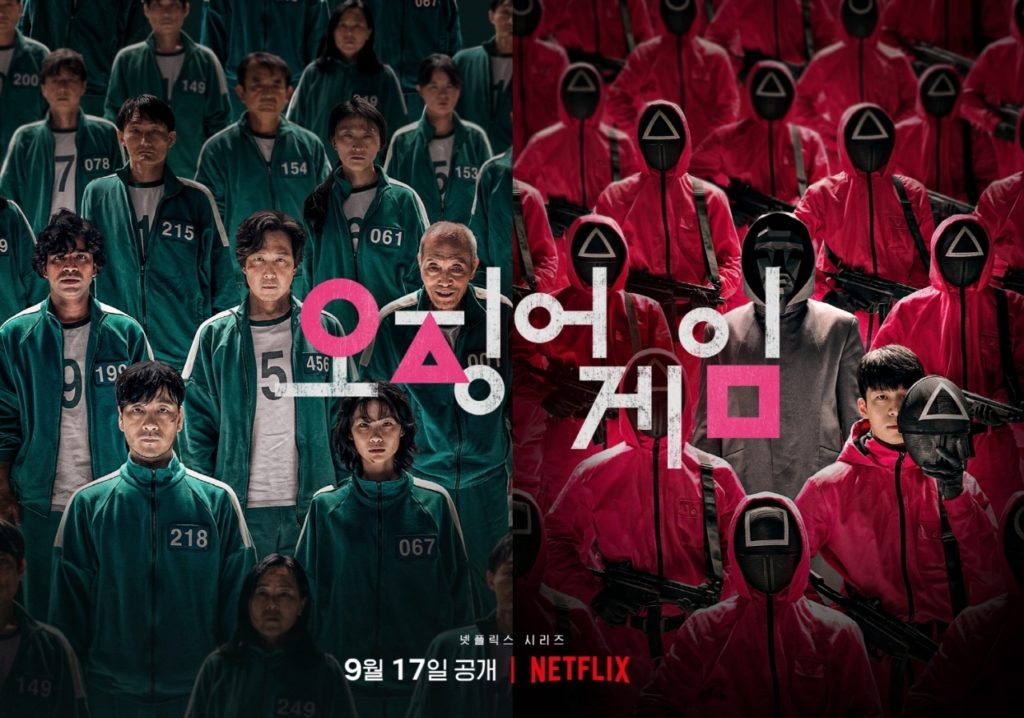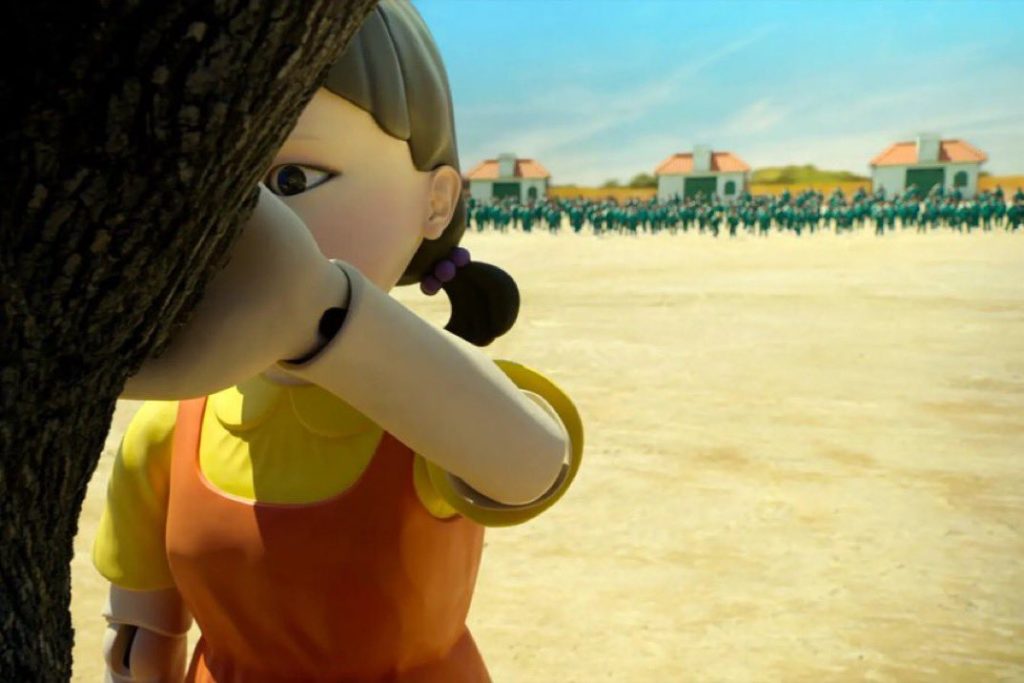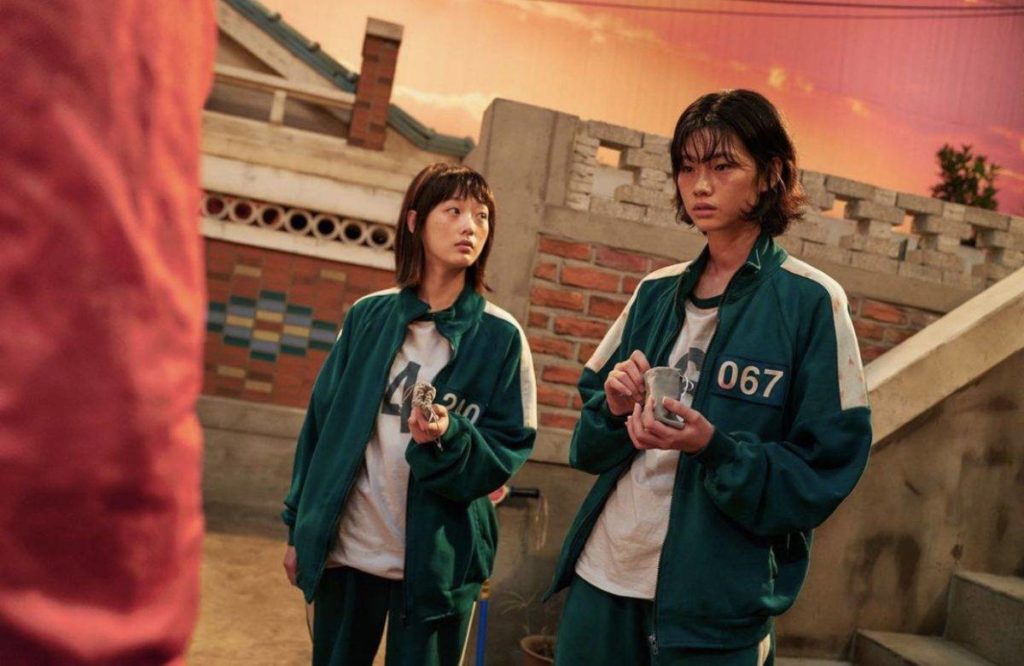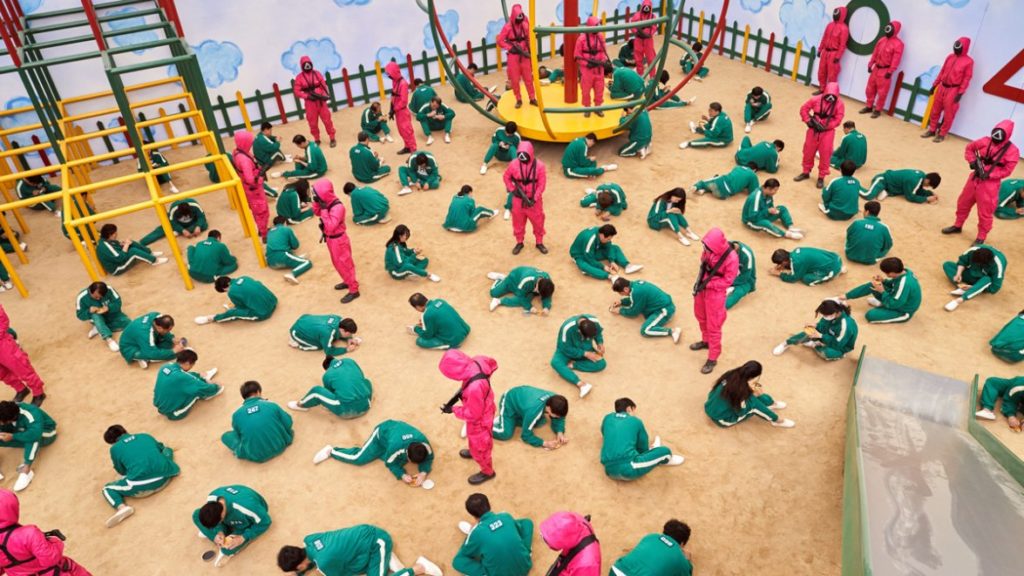
Hundreds of cash-strapped contestants accept an invitation to compete in children’s games for a tempting prize, but the stakes are deadly.
Released less than a month ago, the South Korean television show has skyrocketed to the #1 ranking on Netflix, exceeding the viewership of any other non-English series on the streaming network. For horror fans, it’s no surprise that this series is a hit, but it’s shocking to think about its popularity with non-horror fans. Transcending the shock value inherent in most death game horrors, Squid Game instead utilizes nostalgia, immense character development, and a tender treatment of life’s hardships to question everyday moralities we take for granted.

At the center of this story is Gi-Hun, a middle-aged man that could be best summed up as a gambling-addicted deadbeat dad and horrible son. He is charismatic and likable in his own way, but lets everyone around him down, most of all himself. The show starts off by proving to us that anytime he is given the chance to take responsibility and do right he runs in the opposite direction. In fact, Gi-Hun with a wad of cash is more anxiety-inducing than any of the death games depicted in the show. How he ends up participating wouldn’t really surprise anyone.
However, as the show goes on Gi-Hun proves to be a tenderhearted moral compass within the barbarous world of the games, and actor Lee Jung-jae is incredible at the subtle physical acting necessary to show Gi-Hun’s emotions as he navigates through this world. While others are trying to win, he is trying to keep himself and as many people as possible alive. Succeeding at life and being a good person prove to be very different things, and through Gi-Hun’s reactions to this world the viewer is put in an interesting perspective of finding themselves disgusted by the whole affair and wanting to see everyone make it out through some twist of good fortune. It confounds the genre by taking away the enjoyment of the deaths, and makes every character valuable and worthy of life.

As we meet more of the participants the nuances of what would force someone to join go so much deeper than a character owing money to the mob, and start to get uncomfortably close to home. The typical dichotomy of the death game genre, where players are either forcibly transported to the games or choose to be therefor messed up reasons, is left behind and makes room for a more grounded examination of the type of desperation that would drive someone into such a deadly scenario. The participants in Squid Game all willingly join, but the concept of that “free will” is challenged as we get to know them and their circumstances better. Their problems are mundane and familiar, such as debt or health problems, or even just a desire for a better life.
Painstaking efforts are taken to humanize everyone, and far from flashy personas in cool outfits, everyone wears a generic tack suit and most players are middle-aged adults that could easily be our neighbors. There are no stereotypical sociopathic killers, and the only monster in the midst of Squid Games feels more like an exploration of failed machismo, and big fish in a small pond vibes. Among the main characters are also a Pakistani immigrant desperately trying to get his extended family to South Korea while supporting his wife and son, and most surprisingly a North Korean refugee trying to bring a parent over and get stable housing for them and a sibling.
For those who are unfamiliar, North Koreans have typically experienced a difficult transition after they successfully flee to South Korean and are granted citizenship; facing prejudice, outright hostilities, and feeling isolated from the culture. In 2019 shock waves were sent through South Korea with the news that a formally North Korean woman and her 6 year old son had died of starvation, penniless with no friends or support network–despite having tried to acquire government assistance–bringing national awareness and outrage to the issue of how needlessly difficult the lives of these refugees have been. It’s a bold move for the show to tackle the issue head on, much like Bong-Joon Ho’s The Host (2006) in defying South Korean taboos and depicting an adoption.

Death game horrors tend to base their metaphors and morality in abstract societal-level philosophy; do we force our youth to battle to the death for their futures? Is life so trivial that we would bet on innocent people being forced to kill each other? Would even the nicest people kill each other for loads of cash? Sure, these concepts are in Squid Game as well, but it takes the viewer a step further in true South Korean fashion as we explore each character in depth, ensuring we really know them before they face their brutal fate. It really begins to feel like life is the rancher with a cattle prodder herding wayward souls into the slaughter that is Squid Game.
The setting is one of the most visually compelling designs I have seen in a horror to date. The location where the games take place is surreal and cartoonish, with delicate pastels and outlandish proportions, and everything feels like a larger than life childhood bedroom. The death games themselves are all mimics of schoolyard games, some even non-Koreans would recognize.
The games themselves are perhaps overall drastically less shocking when compared to others of the genre, though no less creative, and the show often shies away from all out gore and body trauma. However, they are no less psychologically horrific because something as innocent as children’s games are twisted into the means of death. Far from other franchises in the genre, where characters must outright murder each other or deal with otherworldly obstacles, it’s easy while watching the show to imagine what the characters are experiencing because we have all played games like these. It feels close to home in an uncomfortable way because cherished memories are twisted into a grotesque instrument of murder.

The first death game is misleading in it’s grandeur in that most of the subsequent games are much simpler, and death often comes by a bullet from a masked onlooker implementing the rules of each game. In fact, Squid Game does an incredible job of making guns and a faceless observer “just doing their job” incredibly terrifying. A quick bullet and red blood splattered across playground sand chill you to the core and manages to never lose its edge. Making guns scary is a feat of its own since the proliferation of them in cinema often creates a desensitization of their presence.
The greatest achievement of the show is that the loss of life just feels like a tragic waste, with no glory or redemption. Heart wrenching scenes hang with you, trail you, invade your dreams and your quiet time, and the viewer is given no greater meaning, philosophy, or triumph…. it’s just fucking sad. Tears come easy with this show, but in a feat of storytelling the most tragic scenes are the most beautiful. Love and humanity permeate the darkness moments.
The finale definitely sets up for a second season, and with the show’s wild popularity there is no doubt that it will be forth coming. With the ending of Season 1 it is likely that the tone of Season 2 will be different, but I have faith that it will be no less profound. Do yourself a favor and check out this show on Netflix today!
More from Netflix
While zombies have traditionally been mostly influenced by Western culture, the zombie sub-genre has been getting a resurgence these past few years thanks to South Korea. Zombies are some of… Film trilogies are a tricky business. With the exception of Lord of the Rings and Star Wars, most trilogies don’t set out planning to tell a singular story across three… Horror television shows are having a special resurgence in an era of lockdowns perfect for sedentary binging – production values have also been drastically amplified as these start to resemble… Ten years ago in 1994, I was walking into the local bookstore to pick the new…wait….that was 27 years ago? Fine then, I will start over. Almost 3 decades ago,… Dubbed the most evil house in America by demonologists Ed and Lorraine Warren, 112 Ocean Avenue, Amityville, Long Island, New York has definitely piqued the curiosity of many horror fans… Life is a Train Wreck In the final days of 2022, most of us were looking toward 2023 with hearts full of hope, and faith that the moment those…The Top 5 Most Memorable Zombies of Pinoy Cinema
Fear Street Part Three: 1666 Film Review – Even the Strongest Curse Can be Broken
Best Horror Television Shows of 2021
Fear Street Part One: 1994 Film Review – Nostalgia Soaked Horror
Shock Docs: Amityville Horror House – Paranormal Documentary Review
White Noise (2022) Film Review – Arthouse Existential Horror Comedy

A study in contrasts, Aubry is a lover of knitting and rescuing strays, but also most likely the one cheering loudest during gory horror scenes.
Someday she’s going to get too excited and accidentally stab herself with a knitting needle.





